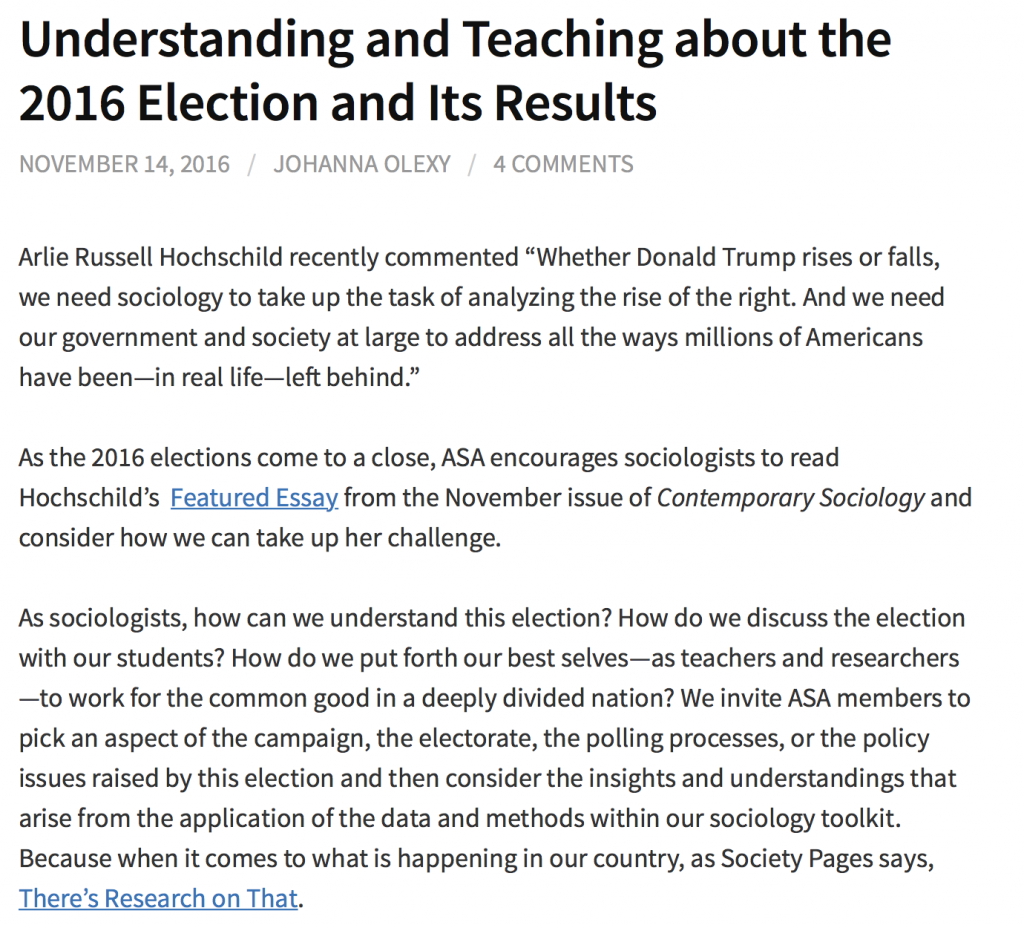I and several others sociologists were recently invited to write reflective pieces on the election of Trump. You can read the full text of all the pieces here in the newsletter of the American Sociological Association, Footnotes.
Below are snippets of the engaging pieces:
Climate Change and the Election by Todd Beer
“2016 will be the hottest year on record with every month thus far setting an average temperature record high. As a discipline, is the span of our engagement in the issue broad enough and deep enough considering the predicted consequences of inaction? Climate change received just six minutes of attention in all three presidential debates. As a discipline, are we giving it more than that?”
Islamophobia and the Trump Campaign by Charles Kurzman
“During the presidential campaign, one survey firm (Public Policy Polling) fielded the question, ‘Do you think the religion of Islam should be legal or illegal in the United States?’ In October 2015, 36 percent of Republican respondents said Islam should be illegal, … If these samples are representative, then around half of Republicans — who normally support religious freedom — are unwilling to grant this freedom to Muslims.
Where did this animosity come from? …” read more to find out
How Sociology Helps to Process the 2016 Presidential Election by Lisa M. Martinez
“In response to my students and the audience members, there is a lot we can do. For starters, we can use the tools of our discipline to understand and analyze the factors that led to the deep divisions in our country. We can translate what we know into informed action whether this occurs through political strategizing or activism. We also have an obligation to our students to teach public sociology and bring social issues to light. Through our scholarship, we can counter racist and xenophobic scapegoating by providing counter-narratives around the pain marginalized communities will and are experiencing. We can also focus our energies on social movements, disruption, and resistance. But we must also engage in long-term planning by mobilizing, registering voters, and getting out the vote in 2018 and 2020. …” read more
Masculinity, Inequality, and the 2016 Presidential Election by Tristan Bridges and C.J. Pascoe
“Sociological research and theory on masculinity and gender inequality explain, in part, the success of a man who uses “locker room talk,” regularly objectifies women, calls them “nasty,” and looms over them in a way that is recognized as dangerous by survivors of violent relationships or sexual harassment. The easy answer is that men are voting for the continuation of an unequal gender system that privileges them. …” read more
. . .
Additional resources and initial thoughts from sociologists on the 2016 election can be found on the ASA blog, Speak for Sociology.
. . .
Click on the image below to access the full essay.
. . .
Click on the images below of a selection of other essays to be take to the full text.
. . .
. . .
. . .
Teach well, it matters.






Comments 1
SOCIOLOGISTS REFLECT ON TRUMP’S ELECTION — The Society Pages – Sociology with LDV — January 4, 2017
[…] via SOCIOLOGISTS REFLECT ON TRUMP’S ELECTION — The Society Pages […]